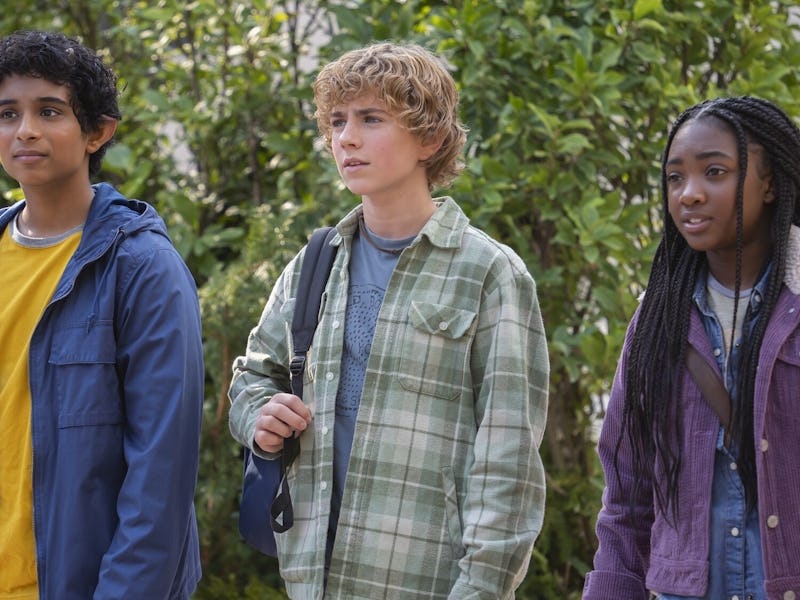Percy Jackson Season 2 Needs to Fix One Crucial Character Mistake
The series could do with its heroes being a little less capable.

The first season of Percy Jackson and the Olympians is an imperfect success. It’s a vast improvement on the Logan Lerman-led, largely unfaithful film adaptations of Rick Riordan’s beloved YA fantasy novels, and it’s got a few genuinely thrilling moments scattered throughout its eight episodes. The season also suffers from muddy and ugly backgrounds as a result of its extensive use of the Volume, and its pace grinds to such a halt at times that the series itself occasionally begins to feel downright sluggish.
On top of those problems, Percy Jackson also makes the rare mistake of making its characters too smart for their own good. In doing so, the Disney+ series renders many of its first season’s biggest moments disappointingly toothless. But Percy Jackson’s second season has a chance to right this wrong.
Percy Jackson and the Olympians makes the rare mistake of making its heroes a little too smart for their own good.
In Rick Riordan’s original Percy Jackson novels, Percy (Walker Scobell), Annabeth (Leah Sava Jeffries), and Grover (Aryan Simhadri) are all intelligent and quick-thinking, but they’re not so smart that they’re immune to being surprised or caught off-guard. Percy, for instance, doesn’t understand the nature of Kronos’ plan to overthrow the Greek gods until Poseidon (Toby Stephens) questions him about his quest, and he doesn’t realize that Luke (Charlie Bushnell) is the real thief of Zeus’ (Lance Reddick) lightning bolt until his fellow camper has literally summoned a scorpion to kill him.
In Disney+’s Percy Jackson, Scobell’s young hero deduces Kronos’ plan the second that Grover is nearly dragged into Tartarus by Luke’s cursed, winged shoes. He later figures out Luke’s treachery before the latter can reveal it to him. In The Lightning Thief, Percy does actually get stung by Luke’s scorpion and he nearly dies. His live-action Disney+ counterpart, however, successfully fends off Luke’s attacks with Annabeth’s help and he makes it out of their fight mostly unscathed.
The book versions of these moments are ominous and dramatic. They not only set up the future events of Riordan’s novels, but they also establish that Percy can be outsmarted. That adds a layer of palpable tension to his book adventures that, unfortunately, Percy Jackson and the Olympians fails to replicate past his midseason fight in the St. Louis Arch. Whether it be Grover’s near-fall into Tartarus, Luke’s betrayal, or their early season encounter with Medusa (Jessica Parker Kennedy), the Disney+ series repeatedly chooses throughout its first season to let its heroes get ahead of its villains — and that’s a decision that robs its biggest moments of any sense of danger.
The same is even true of Percy’s climactic fight with Ares (Adam Copeland). In Riordan’s book, Percy’s battle with the God of War is legitimately tense, and he only wins by thinking on his feet and hitting Ares with an ocean attack that he doesn’t think of until seconds before he does it — taking both readers and his opponent by surprise. The live-action version of their fight blatantly forecasts Percy’s wave attack, though, painting it as the final step of a plan he’s concocted rather than a moment of ingenious, quick-witted brilliance.
Many of the climactic moments in Percy Jackson and the Olympians Season 1 fall disappointingly flat.
It’s important for any show (or story, for that matter) to push its heroes onto their back feet at times, and that’s something Percy Jackson needs to start doing more. Its first season seems to operate under the belief that viewers will only see Percy, Annabeth, and Grover as special and smart if they’re constantly aware of what’s happening to them, but the opposite is true. The instances in Riordan’s books in which Percy and his friends are surprised and forced to think on their feet are what actually make them seem like admirable, properly heroic figures.
Now that it’s been renewed for a second season, Percy Jackson and the Olympians would benefit greatly from leaning further into its heroes’ flaws and shortcomings — rather than away from them.
Percy Jackson and the Olympians Season 1 is streaming now on Disney+.
INVERSE may receive a portion of sales if you subscribe to Disney+ through the link in this article.